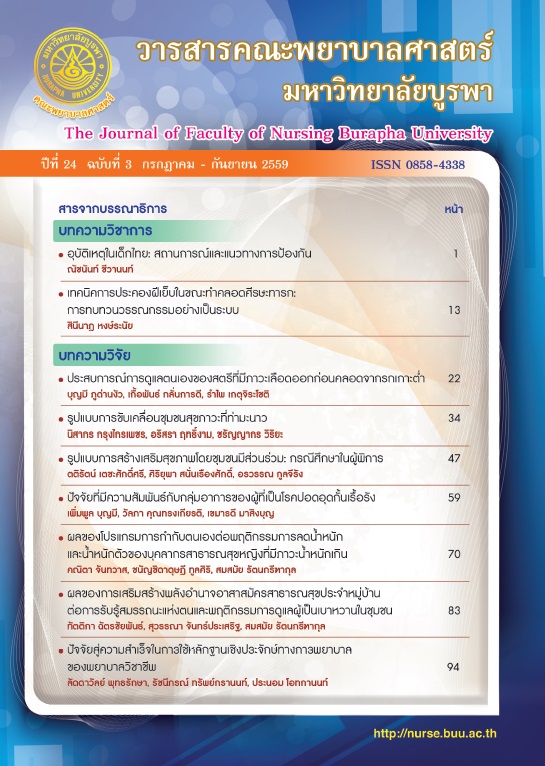รูปแบบการสร้างเสริมสุขภาพโดยชุมชนมีส่วนร่วม: กรณีศึกษาในผู้พิการ
คำสำคัญ:
การสร้างเสริมสุขภาพ, การมีส่วนร่วมของชุมชน, ผู้พิการ, Health promotion, community participation, people with disabilitiesบทคัดย่อ
บทคัดย่อ
การศึกษาเชิงคุณภาพนี้ มีวัตถุประสงค์เพื่อศึกษารูปแบบการสร้างเสริมสุขภาพแก่ผู้พิการโดยอาศัยการมีส่วนร่วมของชุมชนในชุมชนต้นแบบ ผู้ให้ข้อมูลมีจำนวน 12 คน ประกอบด้วยพยาบาล แกนนำชุมชน และผู้พิการ ที่เกี่ยวข้องกับการบริการสร้างเสริมสุขภาพแก่ผู้พิการ การเก็บรวบรวมข้อมูลใช้การสัมภาษณ์เชิงลึกและการวิเคราะห์เอกสารที่เกี่ยวข้อง การวิเคราะห์ข้อมูลเป็นการวิเคราะห์เชิงเนื้อหา ผลการวิจัย พบว่า รูปแบบการสร้างเสริมสุขภาพของผู้พิการโดยชุมชนมีส่วนร่วมประกอบด้วย 3 องค์ประกอบ คือ 1) ปัจจัยเงื่อนไขความสำเร็จ ประกอบด้วยศักยภาพและความพร้อมของแกนนำชุมชน ระบบสนับสนุนที่เข้มแข็งในชุมชน และนโยบายเพื่อสุขภาพของผู้พิการ 2) กระบวนการพัฒนารูปแบบการสร้างเสริมสุขภาพแก่ผู้พิการโดยชุมชนมีส่วนร่วม ประกอบด้วย 3 ขั้นตอน คือ (1) การประเมินสถานการณ์และวางแผนการดำเนินงาน (2) การดำเนินงานโดยการพัฒนาศักยภาพของแกนนำชุมชน ผู้พิการ และครอบครัว การพัฒนาระบบบริการสุขภาพสำหรับผู้พิการ และการปรับเปลี่ยนสิ่งแวดล้อมเพื่อเอื้อต่อสุขภาพของผู้พิการ (3) การสรุปผลและขยายเครือข่ายการดำเนินงาน 3) ผลลัพธ์และผลกระทบที่เกิดขึ้นจากการดำเนินงาน คือ คุณภาพชีวิตที่ดีของผู้พิการและความเข้มแข็งของชุมชน ผลการศึกษาที่ได้นี้สามารถนำไปใช้เป็นแนวทางแก่พยาบาลและบุคลากรทางสุขภาพ ในการพัฒนารูปแบบการสร้างเสริมสุขภาพแก่ผู้พิการที่เหมาะสมกับบริบทของแต่ละชุมชน โดยปัจจัยแห่งความสำเร็จสำคัญที่ทำให้รูปแบบดังกล่าวเป็นไปได้จริงและยั่งยืน คือ ความร่วมมือระหว่างผู้พิการและครอบครัว ภาคีเครือข่ายในชุมชน รวมทั้งบุคลากรทางการสาธารณสุข
Abstract:
The purpose of this qualitative study is to study the health promotion model by the community participation for people with disabilities in the community model. The twelve participants consisted of nurses, community leaders, and disable people who participated in the health promotion services for disable people. The data were collected by in-depth interviews and related-document analysis. Content analysis was performed to analyze the data. The results revealed that the health promotion model by the community participation for disable people was consisted of three components. First, the success factors were consisted of the potential and readiness of community leaders, the strong support system in the community, and the health policy for people with disabilities. Second, the development process of the health promotion model by the community participation for persons with disabilities were consisted of three steps, which are the situation analysis and planning, implementations by developing the potential of community leaders, disable people and their families, creating health services and changing health environment for disable people, and conclusion and learning network expansion. Finally, the output and outcome of the implementations were quality of disable people’s lives and community strength. The findings of this study can be the guidelines for nurses and other healthcare providers in developing the health promotion model for people with disabilities that is suitable for each community. The key success factors to make the model possible and sustainable were derived from the collaboration between disable people and their families, community networks, and health care providers.





